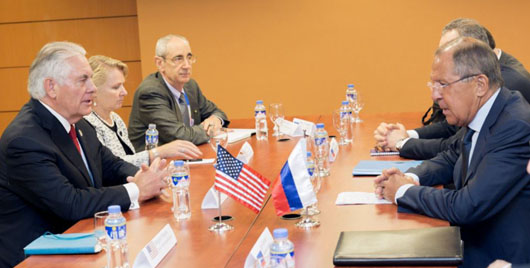by WorldTribune Staff, August 7, 2017
U.S. President Donald Trump’s diplomatic team has been operating in overdrive as it tries to ensure new UN sanctions against North Korea will be enforced while confronting Russia over allegations of its meddling in the 2016 presidential election.
The U.S. on Aug. 7 moved quickly to ensure new UN sanctions aimed at ending North Korea’s nuclear weapons program would hold up amid signs that China and Russia, who voted in favor of the sanctions, may fall short of enforcing them.

The UN Security Council approved the new sanctions in a unanimous vote on Aug. 5.
The U.S. has put China on notice that it is being watched closely to guard against Beijing returning to business as usual with the North and Trump spoke by phone with South Korean President Moon Jae-In who agreed to “fully implement all relevant resolutions and to urge the international community to do so as well.”
North Korea vowed revenge against the United States for the new sanctions. North Korean Foreign Minister Ri Yong-Ho said Pyongyang was ready to “teach the U.S. a severe lesson” with its nuclear force.
“We will under no circumstances put the nukes and ballistic rockets on the negotiating table,” Ri said in a speech to an Asia regional gathering in the Philippines.
U.S. Secretary of State Rex Tillerson said there remains a narrow path North Korea must follow in order to lead to a dialogue and, eventually, the sanctions being lifted. The Kim Jong-Un regime must stop testing missiles for an “extended period,” Tillerson said.
“We’ll know it when we see it,” Tillerson said. “This is not a ‘give me 30 days and we are ready to talk.’ It’s not quite that simple. So it is all about how we see their attitude towards approaching a dialogue with us.”
The sanctions could cut off roughly one-third of North Korea’s estimated $3 billion in annual exports. All countries are now banned from importing North Korean coal, iron, lead and seafood products, and from letting in more North Korean laborers who send remittances back into the country.
Russian UN Ambassador Vasily Nebenzya told the Security Council that sanctions “cannot be a goal in itself” and “shall not be used for economic strangling” of North Korea, according to the Russian state news agency Tass.
John Delury, a China and North Korea analyst at Yonsei University in Seoul, said the Chinese population that lives along the 800-mile border with North Korea is already struggling financially and an economic meltdown in the North would produce a spillover effect in China.
“They’re almost going from sanctions to embargo and really trying to slam the North Korean economy,” Delury said. “If you really start to go down that path, I’m not sure how far the Chinese will go down with you.”
In an Aug. 6 meeting on the sidelines of the ASEAN forum in Manila, Tillerson told Russian Foreign Minister Sergei Lavrov that Moscow’s meddling in the 2016 U.S. election created “serious mistrust” between the two countries.
Tillerson said he tried to help Lavrov “understand just how serious this incident had been and how seriously it had damaged the relationship between the U.S. and the American people and the Russian people, that this had created serious mistrust and that we simply have to find some way to deal with that.”
Tillerson also told Lavrov that the Trump administration was deciding on a response to the Kremlin’s decision to order a substantial reduction in the size of the U.S. diplomatic mission in Russia, a move made in retaliation for a new set of sanctions slapped on Russia by the United States.
Tillerson asked Lavrov “several clarifying questions” about Moscow’s retaliatory moves and warned his Russian counterpart that the U.S. would respond to these actions by Sept. 1.
The secretary of state also told reporters that Moscow had indicated “some willingness” to seek ways to move forward on matters related to Ukraine.
“We should find places we can work together…. In places we have differences we’re going to have to continue to find ways to address those,” Tillerson told reporters.
“The fact that we want to work with them on areas that are of serious national security interest to us, and at the same time having this extraordinary issue of mistrust that divides us, that is just what we in the diplomatic part of our relationship are required to do,” he said.
Subscribe to Geostrategy-Direct __________ Support Free Press Foundation
